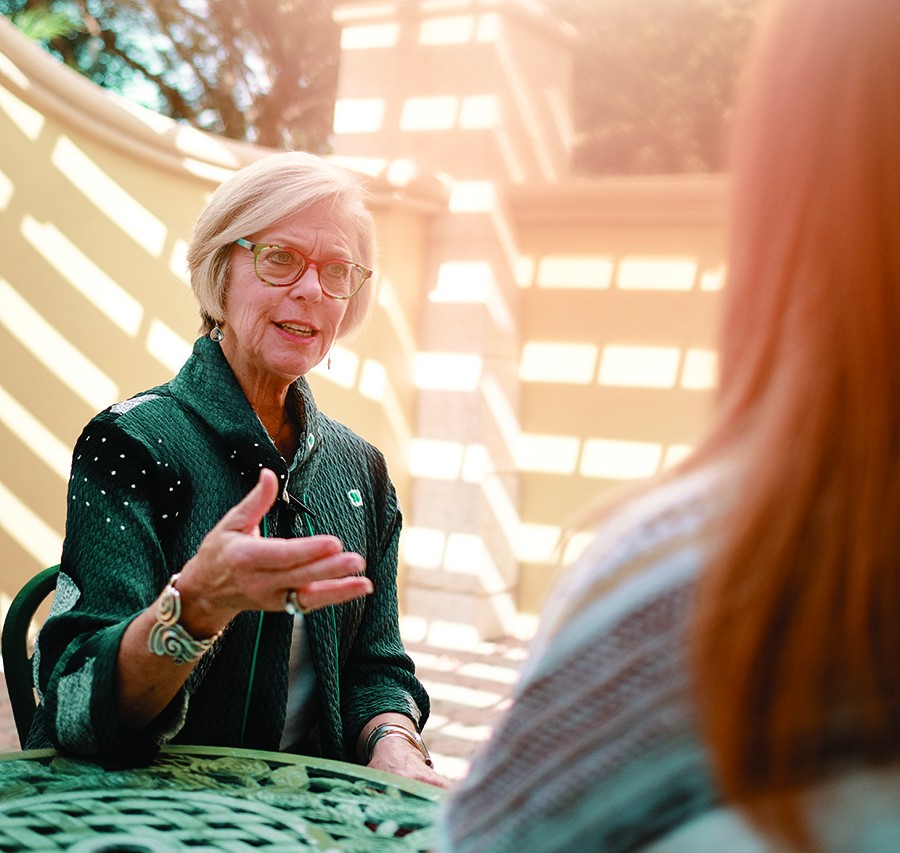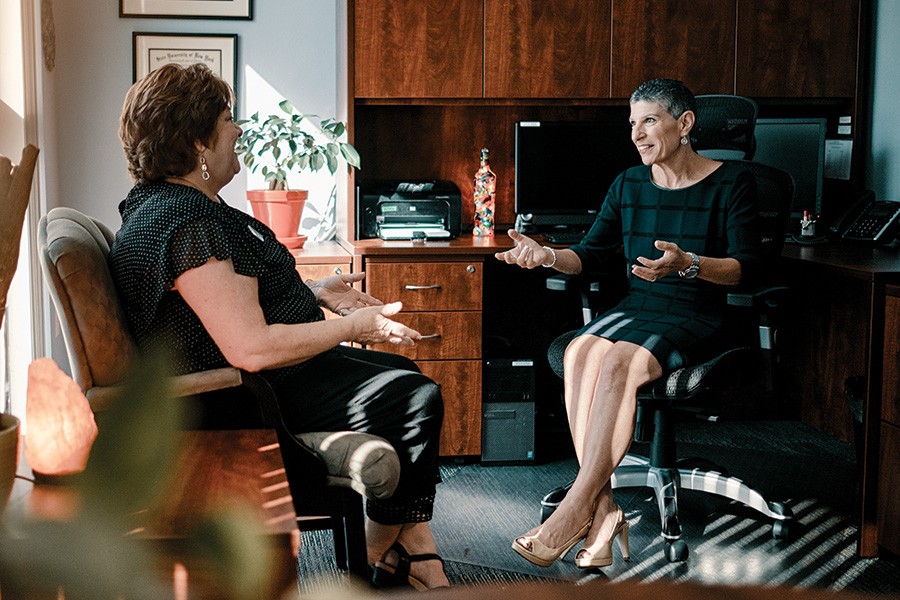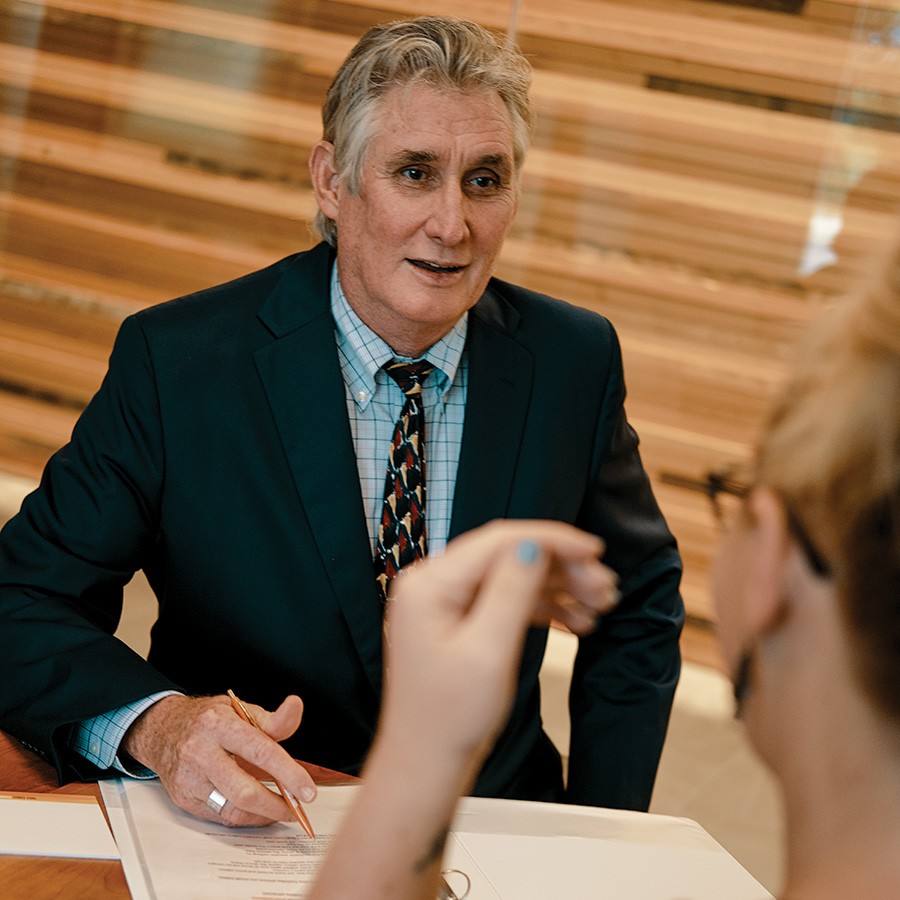A handicap ramp leads up to the door to the Selby Public Library to make sure anyone with trouble walking a few steps to the front door still has easy access to the facility. But on any given day, one may find a homeless person panhandling, or perhaps just grumbling at passersby. It’s a problem that leaves security shooing trespassers and vagrants, tapping people on the shoulder if they look to be dozing off and insisting they instead find another locale. The issue of homelessness has confounded the brightest minds in Sarasota nonprofits for the better part of a decade. But on the library steps one sees the greater issue of “chronic homelessness.” Sarasota officials can enjoy a success story short term, connecting an individual with family or getting them a low-rent apartment. But often, the individuals land back on the street. Why? Because what put them here in the first place wasn’t a fiscal challenge but a mental one.

IDENTIFYING PERSPECTIVE
"We still think of mental health problems in a somewhat stigmatized way," says Jon Thaxton, senior vice president of Community Investment at the Gulf Coast Community Foundation. "It's just viewed as somewhat dirty. If you had emphysema, you would elicit sympathy from people. So why have we not afforded mental health illnesses with the same sympathy we have for other mental healthcare needs?" Thaxton wants a fundamentally different approach. The problem just may be that Sarasota, while perfectly content to put a ramp in for the physically disabled, lacks the interest in treating those emotionally hindered people sleeping on benches with the same level of accommodation.
It’s why, in the past two years, philanthropic leaders banded together to press forward the care of those with mental health problems and improve the standing of these individuals in the system and in society as a whole. The hope is that with a little positive attention, more people will find a ramp to an easier life with the proper care to address what ails them.
“This is the population most underserved in our community,” said Dr. Calvin Tran, a psychiatrist at Centerstone Bradenton. He speaks of mental health patients, a group who often get told by insurers that treatment for depression, addiction and erratic behavior doesn’t count as medically necessary. It’s improving for certain demographics; the elderly have often been able to get diagnosed with dementia and get access to the care they need. There’s also increasing funding to provide mental health treatments and counseling for pediatric patients, if only through channels at school. But much of the adult population, particularly women, can see problems go undiagnosed for years, and when problems do get discovered, it’s difficult to find affordable treatment.
Tran spoke to the Sarasota County Legislative Delegation earlier this year to call on the state to provide better health-care assistance to cover such needs. He stood alongside Centerstone Regional CEO Melissa Larkin-Skinner, a Bradenton executive who worked closely with the state on addressing a variety of mental health needs in Florida. But she says there’s still much more work to do. “This is important work for all of Florida,” she told lawmakers. Larkin-Skinner has been part of some successful efforts in the last year. Following a school shooting that left 17 dead in Parkland, Larkin-Skinner was tapped to serve on the Marjory Stoneman Douglas High School Public Safety Commission. While the working group’s recommendations on campus security have generated the most community debate, the task force also made recommendations on school-system psychological services that found broad support within the Florida State Legislature. Gov. Ron DeSantis signed a bill into law in July requiring public school students to take five hours of mental health courses starting in sixth grade. Additionally, students will be provided access to resources like the National Suicide Hotline and to trained psychologists
on campus when needed.
But Larkin-Skinner says too often individuals won’t take advantage of the services available, whether because of stigma or the fear of absorbing high medical costs. That’s where she wants lawmakers providing easier access to mental health funding.

IMPACTING CHILDREN
Wheather government continues to spend more remains an open question, but the nonprofit world plans to increase its involvement steadily in the next year. Thaxton notes the Gulf Coast Community Foundation identified a need for greater mental health services in the region well before the Parkland shooting. A report published in March notes nearly 4,900 individuals in the Greater Sarasota area have received mental health services, but based on other demographic info on income, stress factors and age, there are likely far more people who need care but do not receive it. A closer look at the numbers finds some 63 percent of youth involved in Sarasota’s court system, more than 13,700 individuals, are in need of some type of mental health treatment, whether for addiction recovery, therapy for sexual abuse or a variety of other needs. In total, some $3.7 million gets spent providing services to these individuals. Thaxton says those figures show that ignoring society’s mental health problems early only increases the social costs later, whether via expenses at jails, rehab facilities or emergency medical care for individuals who leave illness untreated until they run into some type of crisis.
“One problem is that many of these conditions for many years were considered outside the realm of health care,” he said. “But now we know much of this is caused by environmental conditions and genetics, much like cancer. It needs to be treated with the same gravity.”
So Gulf Coast is pairing up with the Charles and Margery Barancik Foundation to fund more early-intervention health-care services for elementary- and middle-school-aged children in the region. In the most extreme cases, maybe this stops the next Parkland shooter from having unchecked, violent fantasies. More commonly, it will get someone showing signs of bipolar disorder or schizophrenia, or someone with addictive tendencies, the help they need at a much younger age and hopefully allow a healthy adult experience in the future. The foundations will work with law enforcement, school officials and nonprofits to identify at-risk individuals.
Additionally, the Community Foundation of Sarasota County has been working closely with The Florida Center for Early Childhood in North Port to strengthen the connections between schools and mental health professionals. Roxie Jerde, president of the Community Foundation, said the effort will be one of the top priorities for the foundation this year.
“The school district really embraced the fact after Parkland that mental needs to be assessed,” Jerde says. So the Foundation began trying to find a way to ensure access to mental health care was treated as a need on the same level as free or reduced lunches for students living in poverty. Some of the outreach took place through successful Summer Learning Academies at schools with the greatest economic challenges.
A key point in working with The Florida Center, Jerde says, was making sure mental health professionals could be put in schools rather than leaving mental health diagnosis and treatment to guidance counselors trained in putting together school schedules and advising students on college readiness.
Kristie Skoglund, chief operating officer for The Florida Center, sees tremendous opportunity and need for improved mental health care in the region. “This organization and what it stands for is having the undeniable impact our services have on the community,” she said. Skoglund has worked specifically with youth dealing with mental illness for more than two decades, and she says the benefits to addressing children’s problems early will guarantee their successes later in life.
The Florida Center provides early-education and therapeutic services for a base of clients throughout Southwest Florida. That includes efforts like Healthy Families, a home-visiting program that guides parents who need assistance. The Center also runs Starfish Academy, a preschool serving children in need of language, literacy, cognition, motor skills, self-help and social skills therapy.
The Florida Department of Health has documented a startling rise in the last couple decades of school-age children on the autism spectrum, about 0.9 percent of all students enrolled in Florida schools. More than 5 percent of students suffer some kind of learning disability, many of which fall under the umbrella of mental health. Skoglund said that shows the need to have professionals trained in mental health treatment engaged with the school system.
This year, the schools funded 15 health professionals working within elementary schools in Sarasota County, with The Florida Center also offering support as needed for middle and high schools.
“The district doesn’t want to employ therapists because that’s not their area of expertise, but they have partnered with us,” Skoglund says. “We are working closely with the school district to make sure we are embedded and part of their fabric in their schools.” The professionals are “trauma-informed,” so they can deal with a range of problems taxing the mental health of youth. And in the most challenging situations, the professionals can work with students’ families to get them help outside of the school day as well.

ROLE OF NONPROFITS
A renewed interest in the mental health of Sarasotans has also inspired the return of a number of programs in the region. Jeffrey Peterson, whose parents years ago ran the Sunshine from Darkness program to raise awareness of mental illness, announced last March he will relaunch a symposium series with the same mission. "Our mission is to continue the work of my parents and fund local nonprofits who provide services for those suffering from mental health disorders and substance abuse," says Peterson. The Sunshine from Darkness Journey to Wellness Symposium and Inspiring Hope Dinner taking place this March 2020 will feature guests Steve Ford and Kathy Cronkite, the children, respectively, of former President Gerald Ford and news anchor Walter Cronkite, to discuss their current efforts at raising awareness of America’s existing mental health crisis and Pulitzer Prize-winning journalist Ron Suskind, who has written books about surviving depression. Steve Ford and Kathy Cronkite will be presented with the organization’s Lee and Bob Peterson Luminary Award. Ron Suskind will receive the Lee and Bob Peterson Advocacy Award.
That’s not the only work happening in the region. Jewish Family and Children Services of the Suncoast in 2018 launched a six-county effort to provide counseling and case-management services specifically to address mental health needs. That starts with providing ancillary care to those with other conditions; think group counseling for cancer patients or suicide prevention for the region’s concentration of Holocaust survivors.
“We are continuing to unmask the stigma of mental health,” says Heidi Brown, CEO for JFCS. “It’s work we have been doing for some time, but we are talking about it differently and we are suddenly having a whole different conversation.”
Counseling has converted into a rapid-response-type operation, aiming to provide mental health services to individuals in crisis the same way you would want to provide medical attention or economic assistance, according to Mary Bane Stevens, director of counseling and services for JFCS. There’s also a greater effort to provide the care without disrupting individuals’ lives, particularly students.
Stevens says there’s greater interest than ever in addiction programs like Camp Mariposa. The service helps not only those suffering from dependence on drugs and alcohol but family members traumatized by the impacts of the disease.
That’s just part of an array of services from childhood counseling and therapy to treatment of isolated adults with dementia, all part of what Brown calls a continuum of care to service individuals’ needs and address challenges at all stages of life.
“Reducing misperceptions and stigma surrounding mental illness and working to ensure access for our youth who have mental health issues is just one of the many reasons I was excited about this opportunity,” said Colleen Thayer, executive director of NAMI Sarasota. Easier access to mental illness treatment will lead to more taking advantage of services, Thayer says, which in turn should reduce the fear of embarrassment over needing a level of care.
The mental health scan done by the Gulf Coast Community Foundation offered a level of insight into the region’s needs. The goal for professionals now is to connect “wraparound services,” Thayer says, and create a comprehensive approach that identifies mental health needs for individuals and provides the right level of care. “Sometimes that’s working with youth and families through the education system,” she says. “Sometimes it’s working through the criminal justice system. There are just a lot of factors at play.”
Thayer throws a hypothetical situation of a mother suffering from postpartum depression, which can in turn create anxiety for older children in school. It could be professionals on campus that identify and address the needs of the older child, but it’s also important to go back to the mother and address the core needs of the family at home. That creates a healthier situation for all involved.
Jerde says, too, that nonprofits must be aware of how services complement one another. Summer learning academies have always had a two-generational approach of helping parents and students, and today that can include yoga classes or meditation training to help adults de-stress while children in the summer take literacy classes.
It all helps address the broader need, Thaxton says, to intervene and assist individuals with mental health at all stages of their life.
The issue in many ways became a front-burner issue in Sarasota during a community-wide push to get the homeless population off the streets. Arguments over shelter situations made headlines in Sarasota for years, with city and county officials debating heatedly over where to put the chronically homeless once taken off the streets. But through it all, officials said they knew the root cause was much deeper.
“Sarasota and Manatee have an incredible network of service providers that have a passion for moving people from homelessness into housing,” said Chris Johnson, CEO of the Coalition to End Homelessness. But it’s also critical individuals end up getting the social services they need.
Sarasota City Manager Tom Barwin feels much of the homeless issue affecting every major city in America today stems from the closing of mental health hospitals in the 1980s and ’90s. He’s lobbied state and federal officials to reopen facilities that serve the population. “Some of these individuals have been cited as many as 90 times for various infractions,” Barwin says. “Our Homeless Outreach Teams with street-level social workers have reached out to most of these individuals repeatedly, offering assistance to get them off the street and into a safe, healthy living environment. But they continue to reside on the street.”
Working with Thaxton and law-enforcement officials, he says a new system has been effectively cobbled together to make sure many suffering from illness in their minds don’t get thrown into jails and holding tanks when they need professional help.”
Today, Sarasota Police, when possible, will direct many such individuals into Community Care Court. There, Circuit Court Judge David Denkin encourages individuals to get into community volunteering programs and to sign up for a continuum of care that includes regular visits with social workers and therapists. "This is one of the first specialized courts of its kind in Florida focusing on a path to end homelessness," Denkin says.
Thaxton said this is one of the new mechanisms that address needs previously unmet in the region, but to scale the services up to fully satisfy Sarasota’s needs requires a funding source. A campaign may start soon to establish a property tax with revenue dedicated to strengthening mental health services in Sarasota County.
“We believe the time is right and people understand now the realistic need for mental health is every bit as real as fiscal health,” Thaxton says. “In fact, mental health is fiscal health.” It’s significantly cheaper to provide the chronically homeless with medical care than it is to constantly imprison them, Thaxton says, once you calculate the cost of repeat offenses.
“It’s unavoidable. Mental health is one of the core causes of homelessness, in particular the ones we consider more problematic, meaning those panhandling in the streets and urinating off sides of buildings,” he said. Once Sarasota stops treating the mentally ill as criminals and social problems, and instead starts addressing the problems those individuals suffer personally, it will do more to solve vagrancy than constant enforcement of city codes and criminal statutes.









